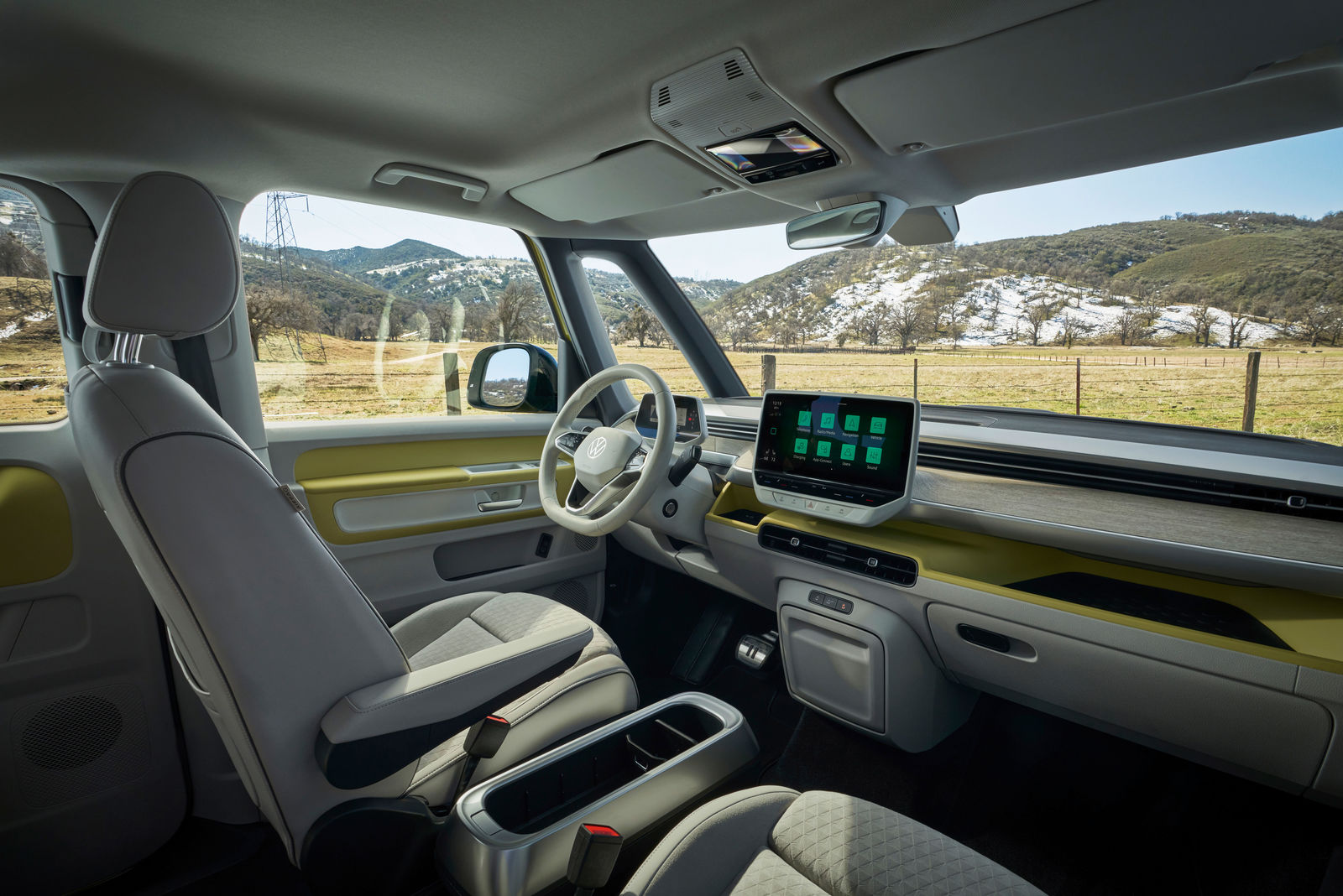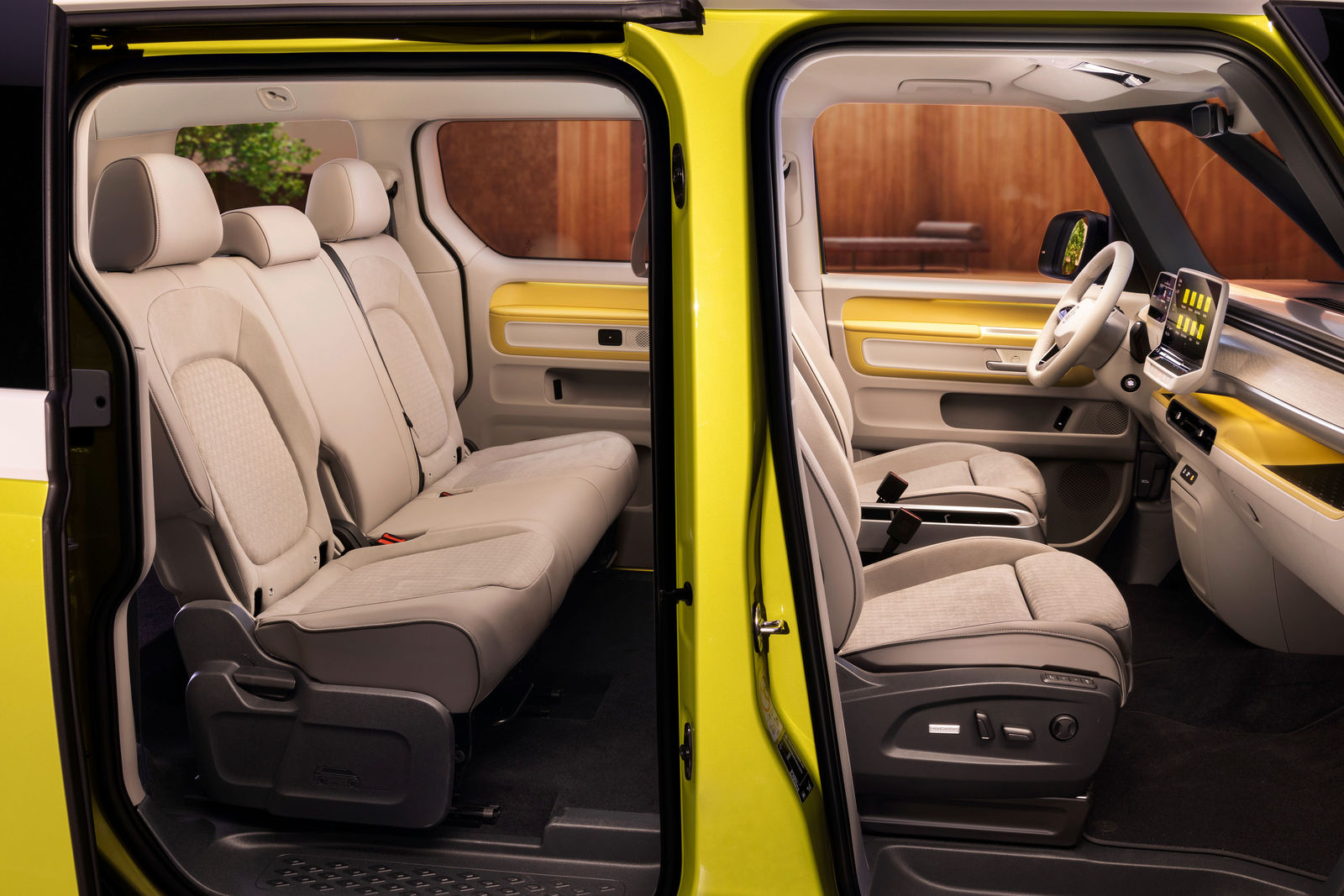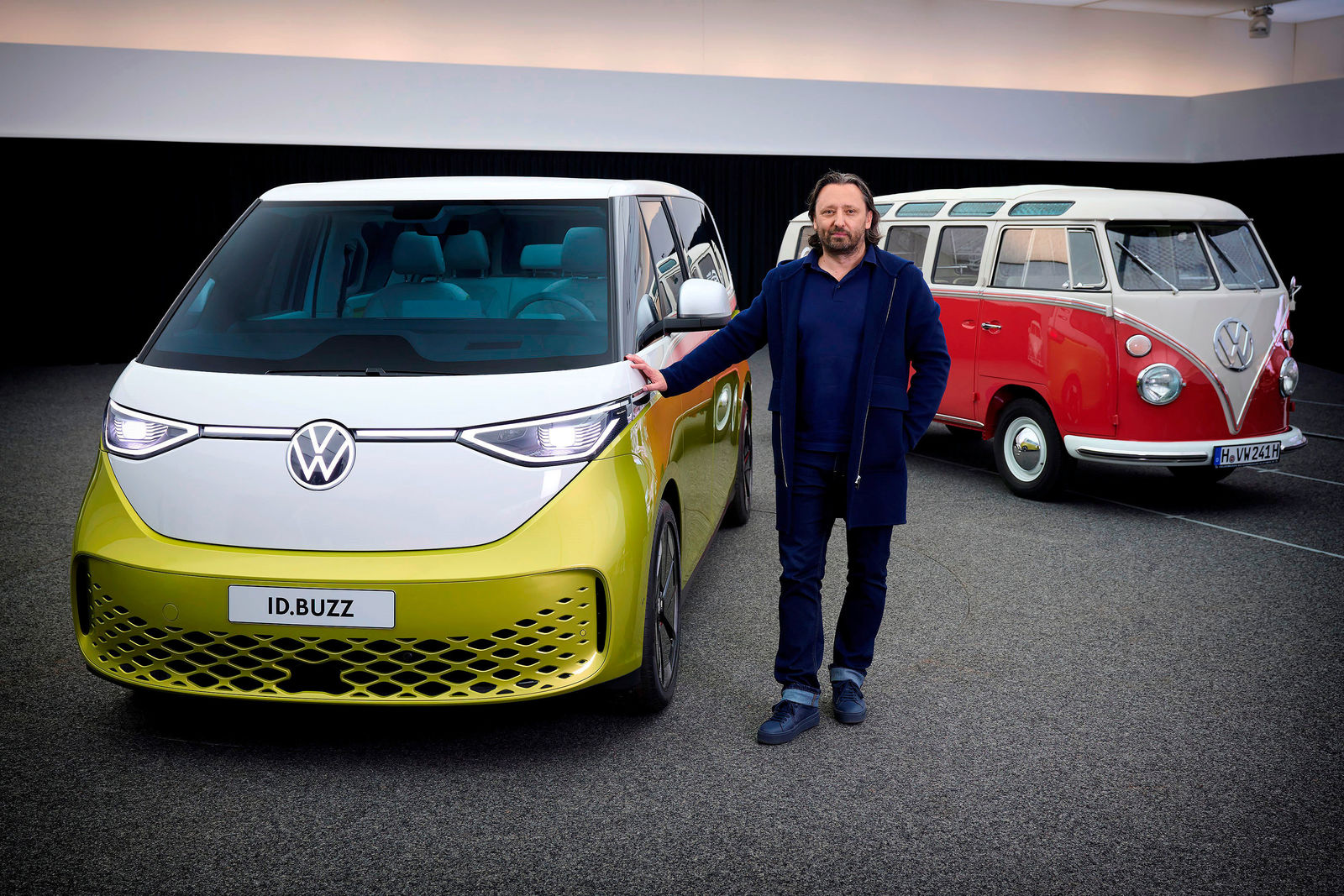- The ID. Buzz combines generous space and comfort with the digital world of smartphones and the home
- Fully digital operation, excellent infotainment features and extremely flexible connectivity
- Numerous USB-C ports for rapid charging with 45 watts, now also for tablets and laptops
- High degree of variability with clever details such as the removable Buzz Box between the front seats
The ID. Buzz is headed sustainably and efficiently into the future, building on the great strengths long offered by Volkswagen buses. The interior of the ID. Buzz is an Open Space with plenty of room, outstanding variability and a high level of comfort. At the same time, the model is a pioneering companion in the digital world. It offers the best possible connectivity thanks to its fully digital operating concept and innovative infotainment system. Technical details such as USB-C ports are also on board, allowing passengers to perform rapid charging of their smartphones, laptops, etc. with a capacity of up to 45 watts. In combination with the clear design and fresh two-tone look, the ID. Buzz becomes a “digital living room” and therefore opens up a new dimension in electric mobility.
Jozef Kabaň, Head of Volkswagen Design, explains: “We have developed a vehicle layout with a logical and intuitive interior concept and variable use of space. The interior becomes a digital living room or office – just like our customers are familiar with from their own homes.”
Up to eight USB interfaces. Customers now have an even larger number of options for using their mobile devices in the ID. Buzz – the electrically powered bus acts as both a digital living room and a mobile home office. Volkswagen optionally supplies small folding tables on the front seat backrests for laptops or tablets – the latter are held in specially designed recesses.
Three USB-C ports are provided as standard for supplying power to smartphones, games consoles, notebooks and tablets used by the occupants in the ID. Buzz. Two of them – with data transfer capability – are located on the right next to the steering column, while the third is in the front passenger door. Customers can additionally order three further ports, one each in the interior mirror base and in the two sliding doors. Two more ports on the walls in the load compartment will follow soon.
Almost all the USB-C ports, except for the port on the mirror, use the latest USB Power Delivery charging standard (USB-PD). This permits rapid charging with a capacity of up to 45 watts, depending on connected device – this is three times the charging power that was previously possible. A compatible office notebook with empty battery can be charged up to 50 percent capacity in around half an hour. Most current consumer electronics devices support the new standard USB-PD.
Digital displays. All displays in the ID. Buzz are digital. Using the touch controls on the multifunction steering wheel, the driver can operate the Digital Cockpit with its 5.3-inch display. This has a free-standing design, just like the large touch display in the middle of the dash panel. With the standard Ready 2 Discover radio system, the screen measures 10 inches diagonally; the standard radio comes with a navigation function that can be subsequently activated. This function is already activated on the optional Discover Pro system; the touchscreen has a size of 12 inches when this system is on board. There are two touch panels under the touch display: sliders allow the audio volume and temperature to be adjusted, while the digital buttons underneath these controls open the menus for parking, air conditioning, driver assist systems and running gear modes.
The Hello ID. voice control. The Hello ID. natural voice control is the third control level alongside the multifunction steering wheel and the touch display. This recognises questions and commands quickly and precisely. The system understands free formulations, asks questions if necessary and allows itself to be interrupted. Answers are provided very quickly and in two ways: offline from the information stored in the vehicle and online from the Cloud.
Intuitive ID. Light. The ID. Light can also be found in the ID. Buzz – the narrow light strip that runs under the windscreen in the vehicle interior. This provides intuitively understandable information using different light pulses. For example, it indicates whether the vehicle is being charged or the direction in which it is necessary to turn according to the navigation system. If the ID. Light lights up completely in red, this means “Caution! Brake!”
Online with We Connect. The online services We Connect and We Connect Plus are optionally available for all variants of the ID. Buzz and come as standard for a limited period. As soon as they are activated, they connect the vehicle with the smartphones of the persons using the services and with the outside world. In addition to Online Voice Control, the highlights in the service portfolio include navigation with Online Traffic Information, Internet Radio, media streaming with the Wi-Fi hotspot and Spotify – an activated We Connect contract is also a prerequisite for the free over-the-air updates.
Remote control. The vehicle-related services are another area of the We Connect world. Using the We Connect ID. app on their smartphone, ID. Buzz owners can remotely control charging and the electric stationary air conditioning (standard) and also check the battery charge level.
Smart device on wheels. With its many infotainment and connectivity functions, the ID. Buzz is a smart device on wheels. App-Connect wireless is on board as standard for smartphone integration. This allows selected smartphone apps to be wirelessly integrated into the native environment of the ID.Buzz and then used conveniently via the infotainment system or voice control. Volkswagen offers users the choice between Android Auto and Apple CarPlay technologies for this. A smartphone stowage area with inductive charging function is also standard. The Comfort mobile phone interface is optionally available – in this case, a charging base is integrated in the dash panel.
Ergonomic gear lever. To match the elevated seat position of the driver and front passenger, ID. Buzz is equipped with a high dash panel – also a typical Volkswagen bus feature. With its strict horizontal contours with the different levels stacked on top of each other, it is just one example of the modern interpretation of the Volkswagen bus interior. The rotary switch for position selection is located on the right of the steering column. From neutral position “N”, the driver just needs to turn the switch to “D” for the vehicle to start moving. Turning to “R” activates reverse gear. The wiper control is located to the left of the steering column, as well as an operating panel for the lights, windscreen and rear window heating and the windscreen defrost function.
Captain’s chairs with high sitting position for driver and front passenger. Typical for the Volkswagen bus, the front seats in the ID. Buzz offer a comparatively high sitting position. Together with the large windows, this ensures optimum all-round visibility. Armrests on the inner sides of the seats are already included in entry-level ID. Buzz Pro. In the higher equipment lines, they are also fitted on the outer sides. In the flagship model, which will follow later, the seats have the AGR (German Campaign for Healthier Backs) seal of approval and are also electrically adjustable.
The multivariable and removable Buzz Box. The ID. Buzz is optionally available with the functional and clever Buzz Box. This can be installed between the front seats and removed again in just one simple step. It features a large stowage compartment in the upper part. Included here for easy access at all times: an ice scraper and a bottle opener. At the front of the Buzz Box there is a 1.4-litre hinged compartment (e. g. for a water bottle). Opposite this there is a 5.0-litre drawer for all kinds of utensils.
Optimum packaging thanks to MEB. 4.71 metres long, wheelbase of 2.99 metres, 1.99 metres wide and 1.94 metres high: the ID. Buzz has compact dimensions, but offers generous interior space. At the market launch, it will leave the assembly line with five seats. Two wide-opening sliding doors, optionally available with electric operation, allow convenient access to the Open Space. The three-seater bench can be moved in longitudinal direction and the backrest angle of the seats can be adjusted. Six- and seven-seater configurations will follow in the medium term, whereby the latter version will have a longer wheelbase. The luggage compartment has a basic capacity of 1.121 litres and a maximum load capacity of 2,205 litres.
More on the subject
Media

ID. Buzz Pro – Power consumption in kWh/100 km: combined 18.9 (NEDC); combined 21.7–20.6 (WLTP); CO₂ emissions combined in g/km: 0; efficiency class: A+++.
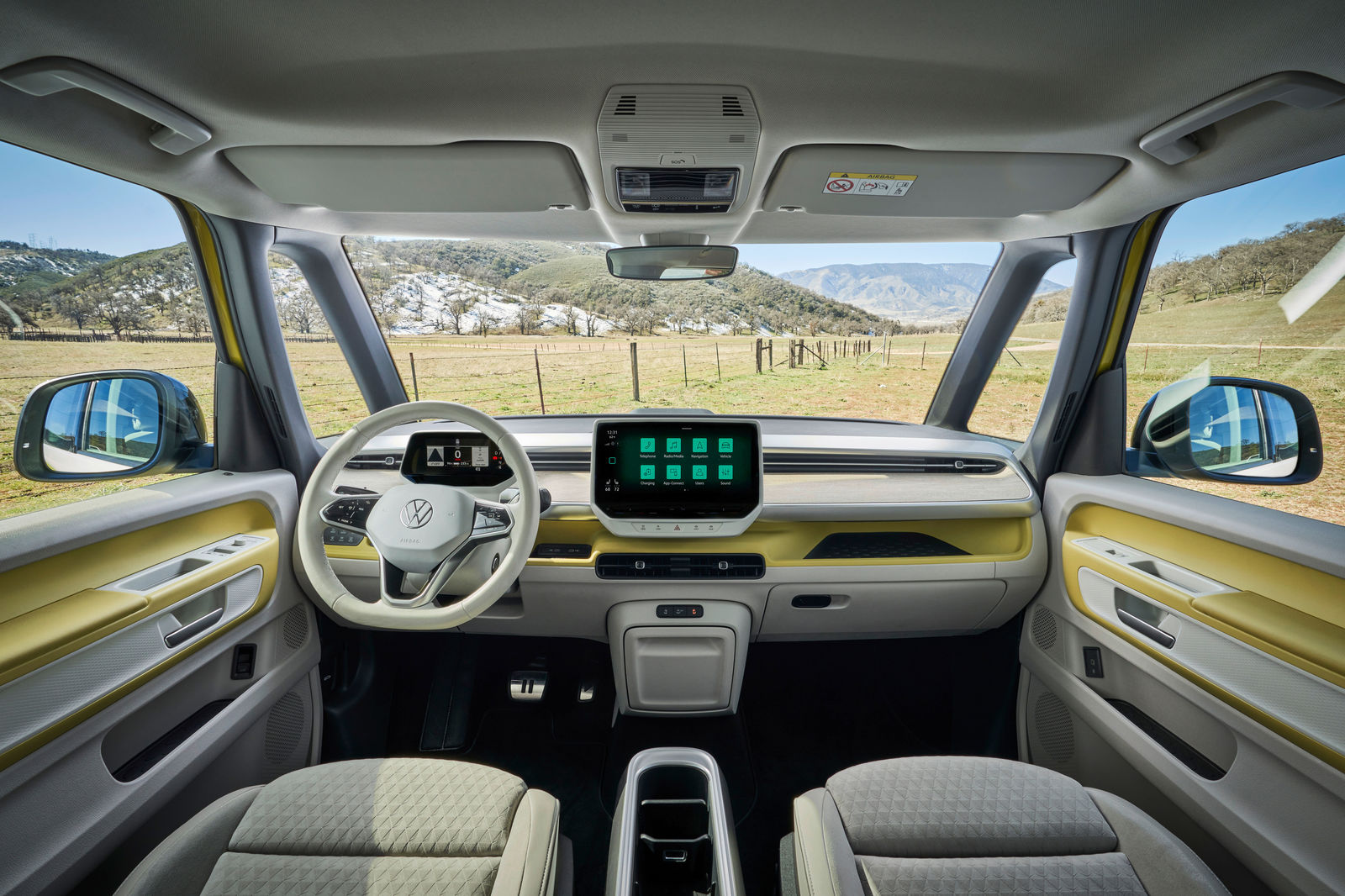
ID. Buzz Pro – Power consumption in kWh/100 km: combined 18.9 (NEDC); combined 21.7–20.6 (WLTP); CO₂ emissions combined in g/km: 0; efficiency class: A+++.

ID. Buzz Pro – Power consumption in kWh/100 km: combined 18.9 (NEDC); combined 21.7–20.6 (WLTP); CO₂ emissions combined in g/km: 0; efficiency class: A+++.
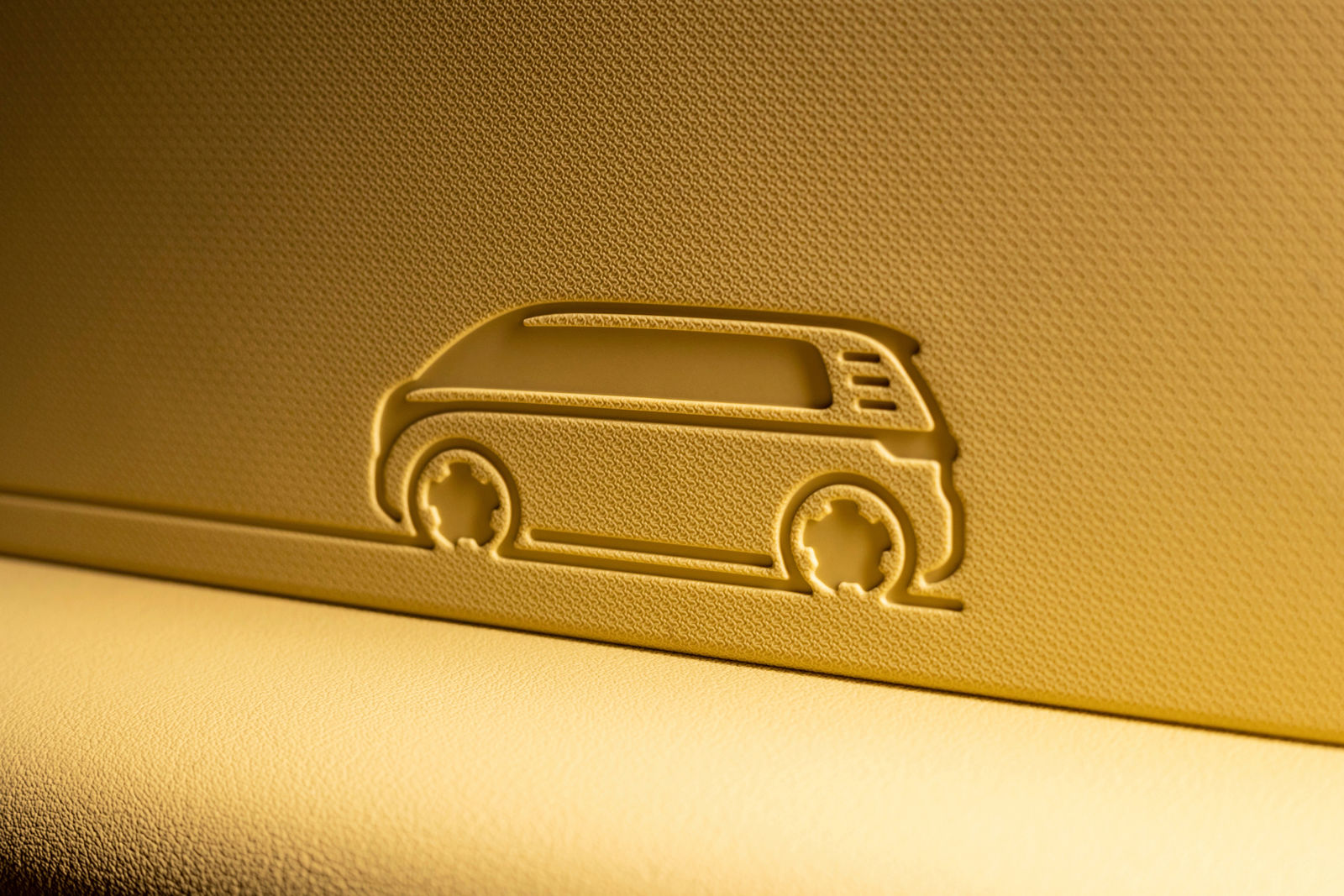
ID. Buzz Pro – Power consumption in kWh/100 km: combined 18.9 (NEDC); combined 21.7–20.6 (WLTP); CO₂ emissions combined in g/km: 0; efficiency class: A+++.

ID. Buzz Pro – Power consumption in kWh/100 km: combined 18.9 (NEDC); combined 21.7–20.6 (WLTP); CO₂ emissions combined in g/km: 0; efficiency class: A+++.
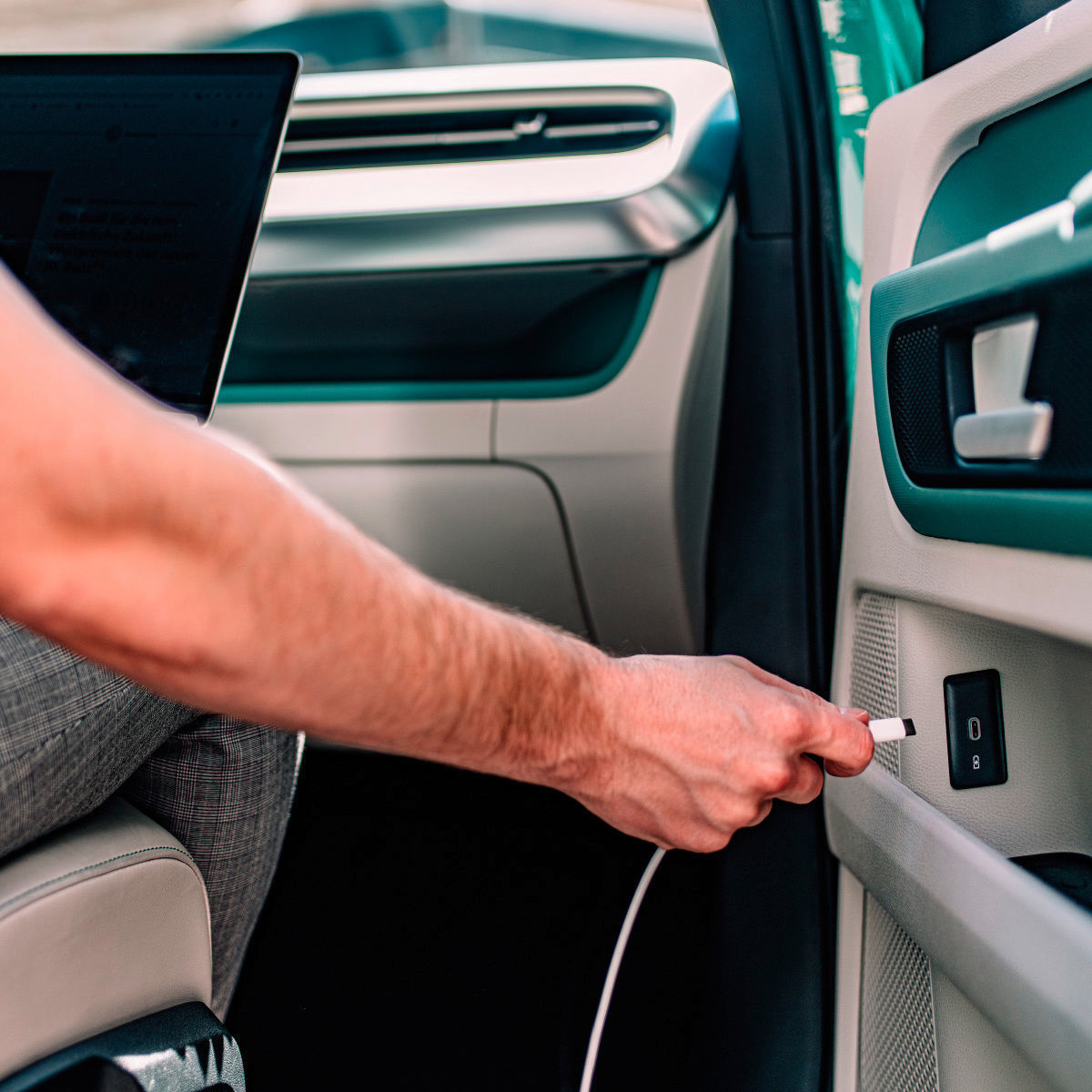
ID. Buzz Pro – Power consumption in kWh/100 km: combined 18.9 (NEDC); combined 21.7–20.6 (WLTP); CO₂ emissions combined in g/km: 0; efficiency class: A+++.
